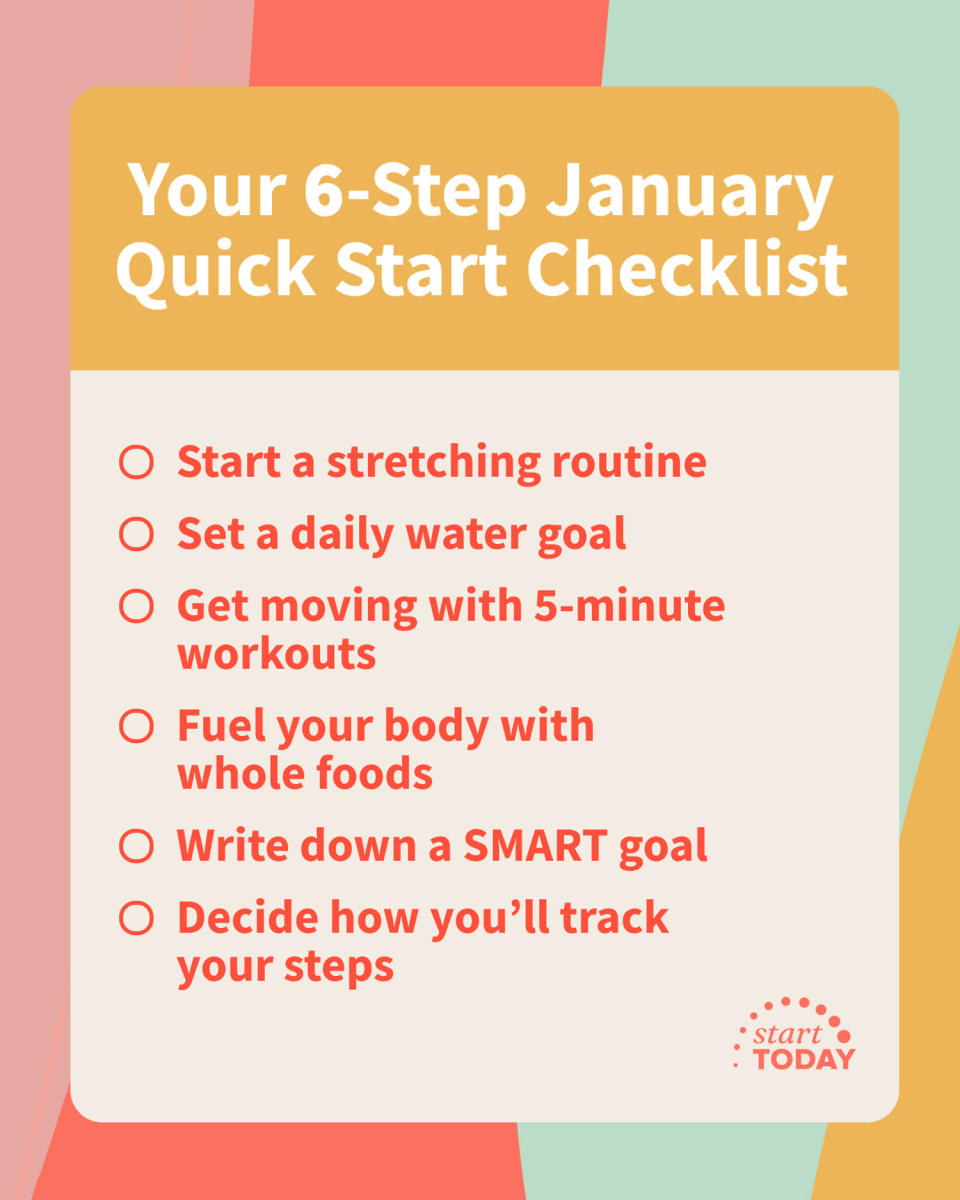Your January quick start guide: 6 ways to ease into a healthier new year
Welcome to Start TODAY. Sign up for our Start TODAY newsletter to receive daily inspiration sent to your inbox — and join us on Instagram!
We're shaking things up in 2024. Our Start TODAY walking challenge starts on Jan. 8, giving you a full week to prep your body — and your brain — for healthier habits in the new year. Think of it as a buffer week to get your mind out of holiday mode and into a healthier 2024.
This quick start plan was inspired by one of our Start TODAY member's success with "habit stacking" — layering habits on top of one another one step at a time so they really stick. There’s no strict daily plan to follow, just a series of helpful habits you can sneak into your day — from drinking more water to sneaking in a quick 5-minute workout. By the end of the week, you'll be ready to tackle our new 100-mile walking challenge that focuses on really racking up those steps!

Start 2024 slow and steady by easing into these six healthy habits:
1. Start a stretching routine.
Are you less flexible than you used to be? Or maybe feel a little achy after a long walk? You likely need to spend a little more time stretching. Stephanie Mansour, TODAY fitness contributor, explains that it's important to improve flexibility and stretch our muscles, loosen up our joints, and become more mobile in a variety of ways. Over time, stretching will improve your range of motion and reduce your risk of injury. Before you start exercising in earnest this January, incorporate stretching into your daily routine. You can get started with this simple 5-minute workout.
2. Set a daily water goal.
If hydration has taken a back seat over the holidays, make it a priority to drink more water this week. “There’s a pretty long list of reasons why maintaining proper hydration status is important for maintaining someone’s health,” Brenda Davy, a professor in the department of human nutrition, foods and exercise at Virginia Tech, previously told TODAY.com. The National Academies of Medicine suggest women drink 9 cups of beverages, including water, per day, while men should drink 13 cups of beverages, including water. Those amounts include the 20% we get from eating fruits and vegetables as well as other liquids like coffee and tea. Experts say these guidelines aren't "one-size-fits-all" and to pay attention to your body's thirst cues. To make things easier, start the day with a glass of water and have a water bottle within reach during the day to get those sips in!
3. Get moving with 5-minute workouts.
If you haven't very been active over the last few months, ease into movement with a 5-minute workout every day. Mansour has developed routines that target every part of your body. Try a few of these quick workouts this week:
4. Fuel your body with whole foods.
If you want to ditch processed foods for more fruits and vegetables in the new year, look no further than the Mediterranean diet. This accessible approach to healthy eating emphasizes nutrient-dense plant-based foods (vegetables, fruits, whole grains, legumes) and healthy fats. The Mediterranean diet has been shown to support healthy weight loss, boost metabolism and brain power, and promote healthy aging. This week's 7-day meal plan will help you get started.
5. Write down a SMART goal.
January has traditionally been a time to make lofty health goals — goals that are often unattainable. That's why it's important to set realistic, SMART goals. Following a SMART goal system can help you zero in on what’s important and it can also keep you accountable. The SMART acronym stands for:
Specific: What do I want to accomplish? Write it down.
Measurable: Is there a way that I can track the results?
Attainable: Is the goal realistic?
Relevant: Is this something that I actually want to do? What will keep you intrinsically motivated is setting a goal that’s meaningful to you.
Time-bound: When is it going to be completed? What steps happen next?
Whether your aim is to eat better, move more or another healthy habit, take some time this week to identify realistic goals using the SMART system.
6. Decide how you'll track your steps.
Our 100-mile challenge kicks off on Jan. 8. During the 31-day challenge you'll count all of your steps — whether you're on a power walk or just getting steps in around the house — with the goal of about 6,500 steps a day or 100 miles in a month. You can track your steps by using your smartwatch, fitness tracker or just keeping your mobile phone on you at all times. Both Android and Apple phones have step tracking capabilities built into their operating systems.
Here's to a healthier, happier 2024!
This article was originally published on TODAY.com

